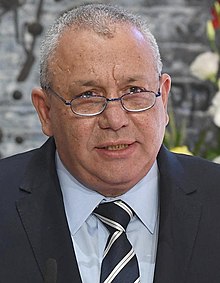Gadi Eisenkot | |
|---|---|
| גדי איזנקוט | |
 Eisenkot in 2020 | |
| Ministerial roles | |
| 2023–2024 | Minister without portfolio |
| Faction represented in the Knesset | |
| 2022– | National Unity |
| Personal details | |
| Born | 19 May 1960 Tiberias, Israel |
| Education | Tel Aviv University University of Haifa |
| Awards | Commander of the Legion of Merit (United States) |
| Military service | |
| Allegiance | Israel |
| Branch/service | Operations Directorate, Northern Command |
| Years of service | 1978–2019 |
| Rank | Rav Aluf (highest rank; Lieutenant general) |
| Commands | |
| Battles/wars | |
Gadi Eisenkot (Hebrew: גדי איזנקוט; born 19 May 1960), also spelt Eizenkot, is an Israeli general and politician from the Israeli National Unity party. He served as the 21st Chief of Staff of the Israel Defense Forces from 2015 to 2019 and from 2023 to 2024, as a minister without portfolio in Israel's unity government. Eisenkot, who grew up in Eilat, pursued maritime studies and later served in the IDF's Golani Brigade. He holds a B.A. in History from Tel Aviv University and a post-graduate degree in Political Science from Haifa University. Married with five children, he resides in Herzliya. One of his sons, Gal, was killed in action during the Israel-Hamas war.
Throughout his military career, Eisenkot held various leadership roles in the Golani Brigade and other IDF divisions. He served as the Military Secretary for Prime Minister Ehud Barak and later as the Chief of Staff of the IDF. During his tenure as Chief of Staff, Eisenkot focused on strengthening IDF ground forces and implementing the "Gideon" multi-year plan, which emphasized force buildup and the formation of a cyber command.
Eisenkot's political views advocate for a state rooted in national-Jewish values while ensuring equal rights for all citizens. He supports a two-state solution with the Palestinians, prioritizing the Jordan Valley and settlement blocs, and advocates for a long-term ceasefire and demilitarization in the Gaza Strip. Eisenkot emphasizes the need for a robust security policy and internal unity in Israel, viewing domestic polarization as a significant threat. He advocates for reforms to strengthen the separation of powers within the Israeli government.